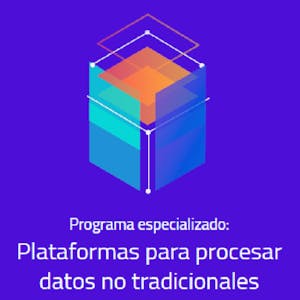Descubre cómo procesar datos no tradicionales a través del programa especializado de Plataformas para procesar datos no tradicionales. Aprende a utilizar tecnologías y formas de resolver problemas que involucran datos semiestructurados, no estructurados y georreferenciados. En este curso, aprenderás a desarrollar aplicaciones sencillas de procesamiento escalable en Spark, identificar los criterios para la selección y uso de repositorios NoSQL, y realizar operaciones básicas de análisis espacial.
Certificate Available ✔
Get Started / More Info
The course covers architectures of Big Data, non-traditional data in NoSQL repositories, and modeling and analysis with georeferenced information. Gain insights into scalable processing, NoSQL selection, and basic spatial analysis through practical examples.
Dive into the world of Big Data architectures and learn about the relevance of using Big Data technologies for a given problem. Develop simple scalable processing projects in Spark and understand the role of cloud computing as an alternative for processing and storing Big Data.
Explore the implementation of solutions based on non-traditional data using NoSQL technologies. Identify fundamental considerations for selecting and configuring tools based on diverse information modeling approaches.
Gain insights into georeferenced information, its frame of reference, and how to model and transform geographic entities. Learn and perform basic spatial analysis operations, and understand and conduct a geographic analysis exercise based on a case study.
Learn to create a project tracker using Airtable, a cloud collaboration service that combines databases and spreadsheets. No prior experience needed.
Introduction to Databases is a comprehensive course covering database concepts, SQL commands, and database design. Gain a strong foundational knowledge in database...
Understanding Basic SQL Syntax - Learn to write SQL retrieval queries with correct syntax.
Prep for Microsoft Azure Data Engineer Associate Cert DP-203 equips you to excel in designing, processing, securing, and optimizing data storage with Azure Databricks...